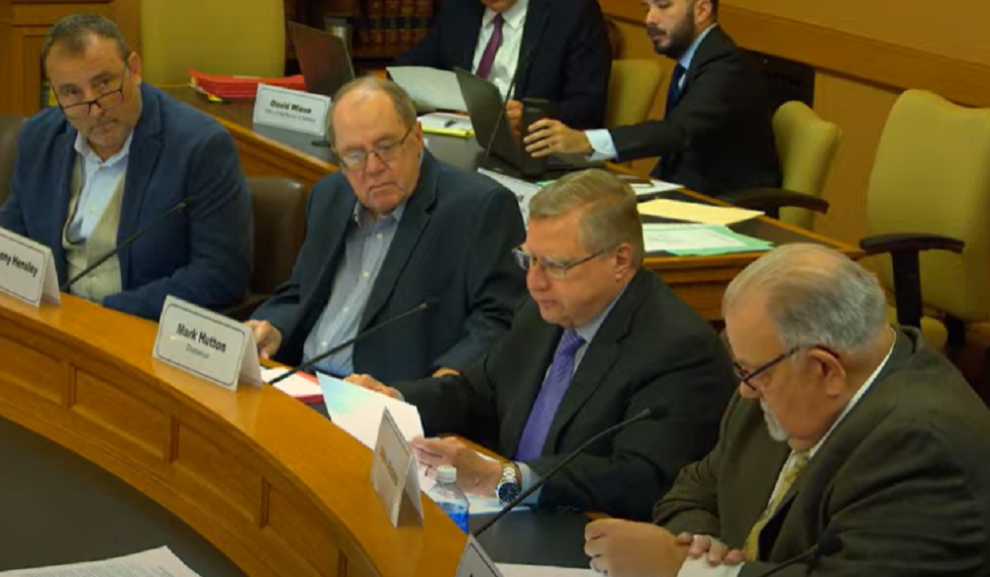New proposal would raise legislators’ annual base salary to $45,000, add more compensation for out-of-session meetings
TOPEKA — After years of stagnant pay, Kansas lawmakers could see their salaries almost double in 2025, including hefty additional compensation for the Legislature’s highest-ranking members.
“What we’re trying to do here is develop a compensation package that would not incentivize but support people from our citizenry that want to serve in the Legislature and not punish them financially for doing it,” said former Rep. Mark Hutton, a Wichita Republican and chairman of the Legislative Compensation Committee.
The nine-person independent commission, predominantly composed of former lawmakers, is tasked with setting legislative compensation rates and salary. To avoid conflicts of interest, lawmakers are left out of the salary-setting process. Once the commission submits a report to the Legislature, the House and Senate have the option of rejecting the plan by introducing and approving a resolution to reject the raises. If rejected, the commission could try again. Without objections, the rates will be automatically implemented.
The draft report, released Monday and approved by the committee Thursday, outlines the proposed new pay package for lawmakers.
Starting in 2025, most legislators would receive a salary of $43,000 per year, marking an approximately $21,000 increase from current compensation. This increased salary is slightly above the estimated Midwest individual yearly income of $41,000.
Leadership in the House and Senate would be set at $70,520, up from the current $36,000. In both chambers, majority and minority party leaders would make $67,940. Other higher-ranking positions, such as speaker pro tem and assistant party leaders would have salaries of $57,190 under the proposal.
Other benefits include added compensation for interim committee meetings and other meetings held outside the regular 90-day session.
While the change marks significant salary increases, retirement compensation won’t increase too much for lawmakers enrolled in the Kansas Public Employees Retirement System.
In the outlined system, lawmakers would receive lower pay during the first 30 days of the legislative session, and then receive pay increases during the rest of the session. Under state law, the first 30 days of session determines KPERS amount per year, so this setup would minimize annual salary pension benefits.
After implementation in the 2025 legislative session, rates will be readjusted every four years. Due to this time frame, the next election cycle in which voters decide who fills all 40 Senate seats and all 125 House seats will end before pay is increased.
Current legislator pay
The re-evaluation of legislative pay comes from Senate Bill 229, introduced by a former legislator and passed in the 2023 legislative session.
The subject of legislative pay has long been a tricky one. The state’s 165 legislators average a base salary of $88.66 for every day during the session, which hasn’t changed since 2008. In an average 90-day session, this pay works out to about $23,429 per year — placing the state in the bottom third ranking for legislative compensation, according to a 2019 legislative study of 14 other states.
Adding pay for interim meeting days and additional compensation for committee chair positions only boosts that number to an estimated average legislator salary of $29,000.
Due to a provision implemented this month, lawmakers are set to receive a per diem allowance of $166 per day to offset food and lodging costs during the session, with additional compensation for leadership positions, still lagging far behind many other states.
The 2019 study found neighboring states such as Oklahoma, Missouri and Colorado paid their lawmakers about $48,000 per year.
The low pay and long hours have created a financial barrier blocking many Kansans from the field, leaving state politics predominantly controlled by those who can afford the pay cut or are retired.
Critics of the pay system say affluent Kansans consequently have a much louder voice in state policy than those from other economic backgrounds.
“How do you get citizens to serve?” asked former Sen. Clark Schultz, a McPherson Republican. “It’s a sacrifice. You could say we’re not going to pay anything and then you’ll get all retirees or wealthy people. We don’t want that, but we also don’t want a $100,000 salary that becomes their job.”
While several lawmakers have acknowledged the problem in recent years, most have been reluctant to self-advocate for pay raises.
The new package is meant to compensate lawmakers fairly without going into excess.
“I believe we’ve done a great job here,” Hutton said, closing out the meeting.
Source : Kansas Reflector






























